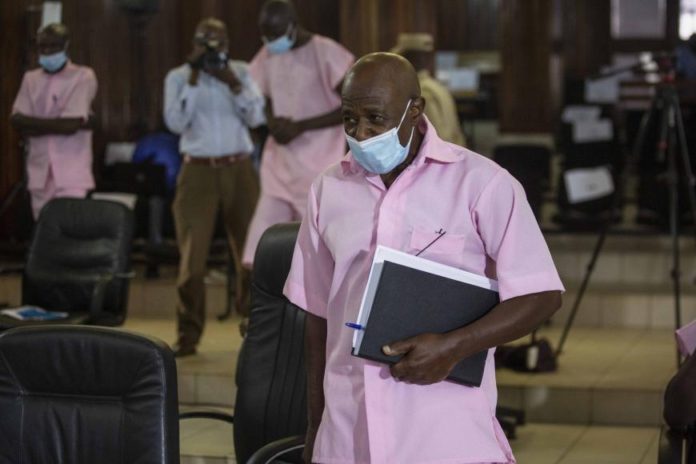
By The Rwandan Lawyer
Introduction
The casefile RP 00031/2019/HCCIC in which are prosecuted RUSESABAGINA Paul and his co-accused is nearing the stage of sentencing as yesterday the public prosecution submitted its requisition whereby there is requested a series of penalties to the penal judge. Even if the court has not yet pronounced its decision thereon, there is an opportunity to conduct an analysis of the prevailing situation given any objective observer who has followed its developments of the proceedings and aware of the circumstances in which the hero of hotel Rwanda was abducted and fraudulent brought in Rwanda may predict what will be the outcomes with the Rwandan courts whose independence is not guaranteed especially for such cases politically sensitive.
1. Requisition of the Public Prosecution
For NSABIMANA Callixte a.k.a SANKARA, the public prosecutor suggested 25 years for terrorism; creation of armed group; abduction; murder; negationism and genocide ideology; forgery and use of forgery referring to two penal laws of 2012 and 2018; law against terrorism and law punishing genocide ideology; and basing on ideal concurrence according to article 62 but the prosecution request 25 years for confessions expressed before Rwanda Investigation Bureau and Public Prosecution and clean criminal record before these charges
For NSENGIMANA Herman, the prosecution proposed 20 years for formation of an irregular armed group or joining it provided and punished by article 200 of the law no 68/2018 determining offences and penalties in general and membership of a terrorist group provided for and punished by article 18 of the law no 46/2018 of 13/08/2018 on counter terrorism.
The public prosecution required for RUSESABAGINA Paul a penalty of life imprisonment as the severe penalty from the different crimes with which he was prosecuted by the Rwandan State which are punished by various penalties of fixed term imprisonment and life imprisonment.
2. Analysis
The public prosecution has enumerated different crimes allegedly committed by the accused and their respective penalties and concluded by communicating the summary penalty. In a nutshell, he focused on the ideal concurrence according to which When two (2) or more punishments apply to a crime, and each values different aspects of the crime, or when one of them is the necessary means to carry out the other, sentence shall be passed for all concurrent crimes, but only the punishment for the most felonious shall be imposed, selected for a term within the upper half in the range of penalties.
In international criminal law, as well as in national penal systems, a defendant may be found guilty of more than one crime as a result of the same act. In that case, the question arises as to whether this act, while breaching several criminal provisions, in reality violates only one. The approach followed in case law is so formal as to provide no limiting effects to cumulative convictions.
2. Critical assessment
The requisition of the representative of the Rwandan public prosecution deserves to be analyzed for some noted irregularities.
1) Mixing repealed criminal law and laws into force
The public prosecution referred the facts to two penal laws i.e. the criminal code of 2012 and the law no 68/2018 determining offences and penalties in general as if some facts were committed under the organic law of no 1/2012 of 2 may 2012 instituting a criminal code and were stopped before the enactment of the new criminal law. In our humble view, as facts prosecuted are continuous, therefore there was no need to raise provisions of a repealed law unless there is specific acts which were carried out and were definitively achieved and were not reproduced.
2) Mitigating circumstances required by the accusing party
The public prosecution required the reduction of penalties for NSABIMANA Callixte and NSENGIMANA Herman the spokespersons of FLN for having confessed their crimes and a previous criminal records in lieu and place of their advocates; this favor unduly requested by the accusation and not by the defence counsels reflects what we had predicted already. Indeed, the very person really targeted is only Rusesabagina Paul while the so-called spokespersons are RPF agents who infiltrated the opposition political organizations and this was overtly evidenced by their statements before the court whereby they were joining the public prosecution to charge him or to refute his defence argumentations especially about the contention of double citizenship.
Without delaying on this behavior of the public prosecution, there is matter to conclude that the Rwandan State is remunerating his agents to have betrayed their chief and consequently helped it to severely incriminate and punish its enemy. People would not be astonished in case the court pronounces a suspension of penalties for these two spokespersons of FLN as if Rusesabagina Paul was physically in Nyungwe forest to commit those murders; lootings and other crimes he is accused of having committed.
Conclusion
When the requisition of the public prosecution is submitted to the court, the accused have the last word to refute it and present their petitions including declaring them innocent and consequently releasing them. Rusesabagina Paul was a defaulting party and logically will not intervene to fight the requisition; the others attended the trial and are entitled to ask for additional favors. In general, this case was more political than other common law trials and manifestly reflected the justice of the victors on the vanquished especially as the presiding judge Antoine Muhima rejected all objections raised by the hero of hotel Rwanda to sufficiently predict him that he is already convicted and that the trial is a mere formality.































































